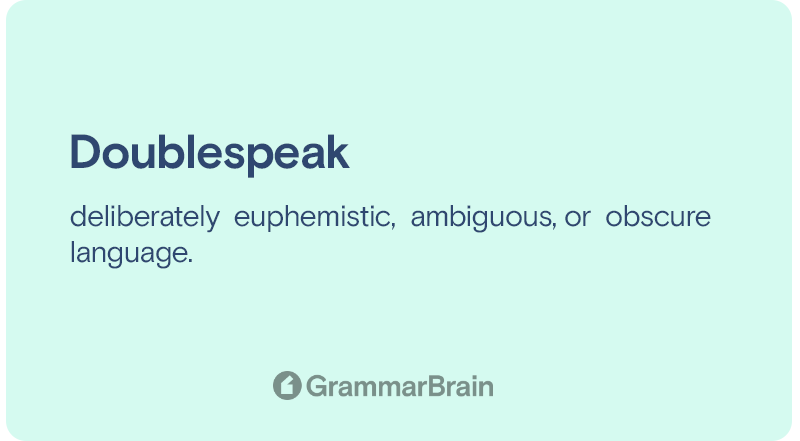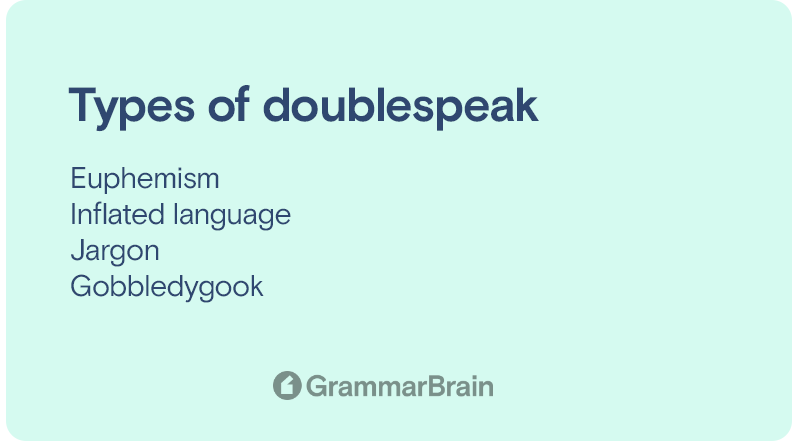What is doublespeak? How does doublespeak work? Doublespeak is something we hear about when we make commentary. Someone could tell us that what we just said is a form of doublespeak. So how does it work? Learn everything you need to know in this comprehensive guide about doublespeak.

What is doublespeak?
Doublespeak is a way of concealing or misrepresenting the truth. For example, if a marketing product like a body lotion says “there can be side effects of using it, the product should say “applying in large quantity can cause rashes”. The first segment in the example is doublespeak where the truth is not being revealed.
| Form | Definition |
| Doublespeak | deliberately euphemistic, ambiguous, or obscure language. |

What are the different types of doublespeak?
Doublespeak is classified into different types and some of them are “Euphemism”, “jargon”, “inflated language”, and “gobbledygook”.
Here is a brief explanation of each one of them with a few examples.
Euphemism
Euphemism is a polite way of expressing something. In this type of doublespeak, pleasant words are used in place of harsh or blunt words to say something. The speaker is being polite to express something.
There are different categories in which euphemisms are used. They are:
Death
Death is a sensitive subject and discussing it in a delicate manner is appropriate. Here are some examples of how to convey death to someone in a polite and delicate way.
Examples:
- Using the phrase “passed away” instead of using the word “died”.
- Using the word “late” instead of using “deceased”.
- Using the phrase “resting in peace” instead of using the word “deceased”.
- Using the phrase “passed away” instead of using the word “expired”.
- Using the phrase “No longer among us” instead of using the word “died”.
Firing from the job
When an employer wants to fire an employee from the job, it can be done in a polite way. Here are a few examples.
- Using the phrase “please submit your resignation” instead of saying “you are fired”.
- Using the phrase “we are terminating your employment” instead of saying “you are fired”.
Financial
Overspending, talking about something which is cheap, or speaking about someone’s economical status can be conveyed in a delicate way. Here are a few examples.
- Using the word “reasonable” when talking about an item that is cheap instead of using the word “cheap”.
- Using the phrase “financially weak” instead of using the word “poor”.
Inflated language
Inflated language is one of the types of doublespeak which is used to exaggerate information. It is typically used to impress or influence someone. Most of the time, marketing companies use inflated language to describe their products. Here are a few examples.
- “I have been to an extraordinary and out-of-the-world restaurant” instead of “I have been to a great restaurant”. The first statement is inflated language.
- “It was a breathtaking experience” instead of “it was a good experience”. The first statement is inflated language.
- “The food was fantabulous” instead of “the food was great”. The first statement is inflated language.
- “The cinema experience was extraordinary” instead of “the cinema experience was great”. The first statement is inflated language.
Jargon
Jargon words are commonly used in a specific occupation or in an industry setting. These words are not commonly used in daily conversations. They are used and understood only by individuals who are part of a specific industry or occupation.
However, if others use jargon in daily conversation, it may sound like doublespeak.
Here are a few examples of jargon:
- “Due diligence” instead of “research”. The word “due diligence” is jargon.
- Using the word “holistic” instead of using “complete”. The word “holistic” is a jargon that is commonly used by health and wellness professionals.
- “Extremism.” The word “extremism” is jargon.
Gobbledygook
Gobbledygook is a language that makes no sense. In other words, gobbledygook is a language that uses excessive technical terms to make the sentence confusing. It fails to communicate the message clearly to the reader.
It is a combination of a few words that make sense and a few words that are technical thereby making the whole sentence difficult to comprehend for the readers. Here are a few examples.
- The sentence “the patient has a fever” when translated to gobbledygook will be “on examining the reports the patient is drawn to the conclusion that he/she agonizing with pyrexia”. Such a sentence uses technical words which makes it confusing to understand.
- The sentence “I want to measure this cloth” when translated to gobbledygook will be “The person is seeking to expedient a product made for non-aesthetic purposes”. Such a sentence also uses technical terms which makes it difficult to understand the meaning of the sentence.
When is doublespeak language generally used?
Doublespeak language is used in different situations, however, using them should be avoided. Here, are a few scenarios where the doublespeak language is used.
To conceal facts about something
Doublespeak is used in situations when someone wants to hide the truth about something and uses words that misrepresent the facts.
For example, a secondhand printer is ten years old and an individual wants to purchase it but the seller describes the item as “fairly new”.
This is doublespeak. The word “fairly new” is something that is recent and not too old. In this example, the word conceals the fact of how old the item is.
To mint money
Doublespeak is used by product-selling companies to mint money. These companies make extraordinary claims when advertising their products, which, after buying them, the products don’t provide the intended results.
For example, beauty cream companies largely make such claims to cash in some extra money.
To say something that is not the ground reality
Doublespeak is used most often by politicians to misrepresent the truth to their voters. They say something that is not even close to reality.
They say this in a subtle way by using sophisticated terminologies. This way they try to present a false picture to the voters.
How often is doublespeak used in everyday language?
It is used quite often in everyday language. Doublespeak appears in English literature books and therefore students get exposed to it through them. In the IT sector, employees use technical jargon to converse.
Even during broadcasting news, journalists use inflated language to sensationalize the news. Interviewee use gobbledygook language to answer a question and confuse the interviewer.
FAQs
1. How did the term doublespeak come into existence?
Doublespeak was derived from two words “doublethink” and “newspeak” which were used in the novel “Nineteen Eighty Four” written by George Orwell. The term was not coined by him but was later coined from the two words. The term was used in the 1950s first and was defined as distorting truth using ambiguous language.
2. What are the different categories in which Euphemism is used?
There are quite a few categories in which Euphemism is used and a few have been mentioned earlier. Here are the other few categories with examples.
Age and bodily functions
Aging and bodily functions are some subjects that people don’t want to discuss bluntly but rather convey aging in a more elegant way. Here are a few examples.
- Using the word “aging” instead of saying “you are getting old”.
- Using the phrase “visit the restroom” instead of using the phrase “go to the bathroom”.
Describing a person’s characteristics and behaviors
A person’s characteristics and behaviors can be described in a manner that doesn’t hurt the person. Here are a few examples.
- Using the word “curvy” instead of “fat” to describe a feature of a person.
- Using the word “inquisitive” instead of using the phrase “constantly asking questions” to describe a person who asks questions repeatedly.
- Using the word “frank” instead of using the word “outspoken” to describe a person who speaks bluntly.
3. Are there any other words for doublespeak?
Yes, there are a few alternative words for doublespeak. They are:
- Doubletalk
- Gibberish
- Sophistry
4. What is doubletalk?
It is another word for doublespeak which is a language that has no meaning or has more than one meaning and is used to conceal the truth.
5. What is the difference between Jargon and Slang?
People get confused between jargon and slang. Both are different. Slang is an informal language used by a group of people in a specific area. On the other hand, jargon is a technical term used by a specific group of people in a particular industry or occupation. The jargon is formal language whereas slang is informal language.
An example of slang is “What’s up”. In comparison, an example of jargon is a software developer speaking of “software development lifecycles”.
6. Is doublespeak a form of lying?
In doublespeak, the truth is concealed or misrepresented to deceive people which means it is a kind of lying. So, it can be said that doublespeak is a form of lying.
7. Where does the word doublespeak come from?
It comes from the George Orwell novel 1984 and is a cross between Orwell’s terms Doublethink and Newspeak.
8. What is political doublespeak?
It’s words and phrases used to intentionally make something untrue sound true. For example, cutting government spending, which has never happened in history. It helps lies sound truthful in political language.
Sources
- Examples of Doublespeak
- Definition and Examples of Doublespeak
- Doublespeak | Vocabulary | EnglishClub
- Definition and Examples of Jargon
- Doublespeak – Wikipedia
Inside this article
Fact checked:
Content is rigorously reviewed by a team of qualified and experienced fact checkers. Fact checkers review articles for factual accuracy, relevance, and timeliness. Learn more.
Core lessons
Glossary
- Abstract Noun
- Accusative Case
- Anecdote
- Antonym
- Active Sentence
- Adverb
- Adjective
- Allegory
- Alliteration
- Adjective Clause
- Adjective Phrase
- Ampersand
- Anastrophe
- Adverbial Clause
- Appositive Phrase
- Clause
- Compound Adjective
- Complex Sentence
- Compound Words
- Compound Predicate
- Common Noun
- Comparative Adjective
- Comparative and Superlative
- Compound Noun
- Compound Subject
- Compound Sentence
- Copular Verb
- Collective Noun
- Colloquialism
- Conciseness
- Consonance
- Conditional
- Concrete Noun
- Conjunction
- Conjugation
- Conditional Sentence
- Comma Splice
- Correlative Conjunction
- Coordinating Conjunction
- Coordinate Adjective
- Cumulative Adjective
- Dative Case
- Determiner
- Declarative Sentence
- Declarative Statement
- Direct Object Pronoun
- Direct Object
- Diction
- Diphthong
- Dangling Modifier
- Demonstrative Pronoun
- Demonstrative Adjective
- Direct Characterization
- Definite Article
- Doublespeak
- False Dilemma Fallacy
- Future Perfect Progressive
- Future Simple
- Future Perfect Continuous
- Future Perfect
- First Conditional
- Irregular Adjective
- Irregular Verb
- Imperative Sentence
- Indefinite Article
- Intransitive Verb
- Introductory Phrase
- Indefinite Pronoun
- Indirect Characterization
- Interrogative Sentence
- Intensive Pronoun
- Inanimate Object
- Indefinite Tense
- Infinitive Phrase
- Interjection
- Intensifier
- Infinitive
- Indicative Mood
- Participle
- Parallelism
- Prepositional Phrase
- Past Simple Tense
- Past Continuous Tense
- Past Perfect Tense
- Past Progressive Tense
- Present Simple Tense
- Present Perfect Tense
- Personal Pronoun
- Personification
- Persuasive Writing
- Parallel Structure
- Phrasal Verb
- Predicate Adjective
- Predicate Nominative
- Phonetic Language
- Plural Noun
- Punctuation
- Punctuation Marks
- Preposition
- Preposition of Place
- Parts of Speech
- Possessive Adjective
- Possessive Determiner
- Possessive Case
- Possessive Noun
- Proper Adjective
- Proper Noun
- Present Participle
- Prefix
- Predicate



